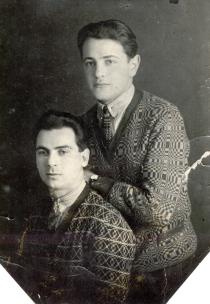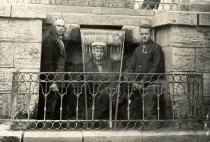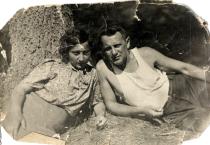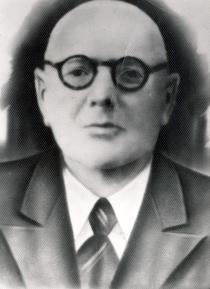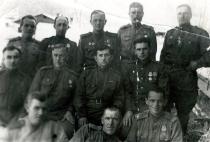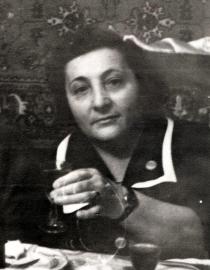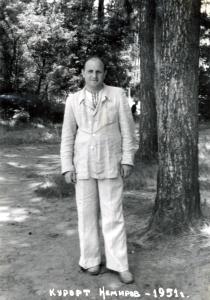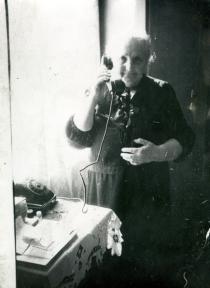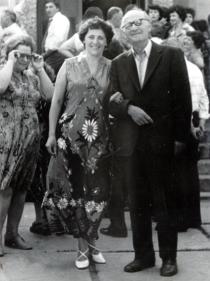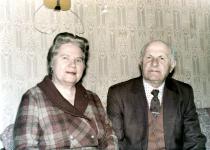
Vladimir Olgart
Kiev
Ukraine
Interviewer: Ella Levitskaya
Date of Interview: October 2002
My father, Mordko Olgart, was born in a small town near Warsaw in 1870. At that time this area was part of the Russian Empire. I know very little about my father's family. His father, Leizer Olgart, and his mother died before I was born. I don't remember my grandmother's name. My grandfather was paralyzed and confined to bed for a long time. My father had two older sisters. At the end of the 19th century they moved to the US, and we had no contact with them. Some time after 1905 my father's family moved to Skvira [about 150 km from Kiev]. I don't know why they decided to move. My father told me that he finished cheder and received religious education.
Unfortunately, I know even less about my mother's family. I have no information about her parents. They both died before my mother, Neha Olgart, turned 15. My mother was the youngest daughter. My mother's parents lived in Volodarka, a small town in Kiev province. My mother was born in 1887. She remained alone in her parents' house after they died. Her older sisters and brothers had moved out by that time. I don't know how many brothers and sisters she had. I knew her older brother Dudik. He was a shoemaker and lived in Skvira with his family. Later he moved to Kiev.
My mother got married to my father when she was 17. My father was much older than my mother. He was over 30 when they got married. I think my father didn't get married at an earlier age because he had to take care of his father. My mother was an orphan and had no dowry. She and my father were married by matchmakers. They had a traditional Jewish wedding with a chuppah and a rabbi in Skvira.
My parents rented a two-bedroom apartment. It was part of a two-storied house. Their landlords also had tenants on the second floor. The rooms were always shaded by lilac bushes growing near the house. My mother cooked on a big stove in the kitchen. They didn't have running water or a well in the yard. Water was delivered to the houses by a water-carrier in big barrels loaded on a horse-driven carriage. He was driving slowly along the streets shouting 'Water! Water!' The water-carrier delivered water twice a day: in the morning and in the evening.
My father was a barber. I don't know where he learned his profession. He was very skilled and had quite a few clients. He owned a barber's shop, but he was the only one working there. My mother was a housewife. My parents didn't have children for some time. They went to see a very wise rabbi who was well known in Skvira and beyond the town. It was the custom to seek advice from a rabbi. People asked him all kinds of questions related to everyday life or business. I don't think he took money for giving advice. People made contributions to the synagogue anyway. He told them that in four year's time they would have their first baby, and from then on they would have a child every second year. It was true. My parents got married in 1904 and in 1908 my older brother Mikhail was born. He was named Moshe at birth. In 1910 my sister Riva was born and I followed on 15th December 1912. I was named Velvel at birth, but later my family began to call me Vladimir. My younger sister Sonia was born in 1914.
Jews constituted 90% of the population in Skvira. They got along well with the Ukrainian population. Jews were mainly craftsmen: shoemakers, tailors, barbers, and traders. There was a big two-storied synagogue in Skvira and a Jewish lower secondary school. When we were 6 my brother and I went to cheder. An old melamed with a gray beard taught us Hebrew, religion and the history of the Jewish people. My sisters studied there, too. It was closed in 1919. My brother and I then studied in a Russian secondary school; the majority of pupils were Jews, but there were Ukrainians as well. It used to be a grammar school before the revolution, and after the revolution it became a Russian lower secondary school. We had wonderful teachers. And the school building was very beautiful, with sculptures on the façade.
My parents were religious people and raised us accordingly. We spoke Yiddish at home, but we also spoke fluent Ukrainian and Russian. Every Friday my mother cooked for Sabbath. She baked challah in the Russian oven, made stuffed fish and boiled chicken. It wasn't allowed to cook or heat food on Saturday. On Friday evening our family got together for a prayer. My mother lit candles and we sat down at the table for a Saturday meal. Our Ukrainian neighbor used to light our kerosene lamps and make fire in the stove on Saturdays in the winter. My father prayed at home on Sabbath and he read a chapter from the Torah to us, and then we had guests over. My father's cousins lived in Skvira and so did my mother's brother Dudik before he moved to Kiev in the 1920s. They visited us with their wives and children. They all had big families. We had a lot of fun. We had tea, cookies and sponge cakes that my mother made. We sang Jewish songs, recited poems and danced. My parents had a record player and records with Jewish songs and dance music. We used to dance Jewish folk dances: sher, freilakhs and skotchna. We also got together at birthdays. My parents went to the synagogue on holidays. There was also a choral synagogue in Skvira. Men prayed downstairs and woman were on the 2nd floor. There was a cantor in the synagogue and often other cantors came on tours. I remember cantor Pinch from Odessa. I went to the synagogue to listen to him when I was a small boy. Many people had tears in their eyes listening to him. He was majestic. Jewish theatrical groups often came to Skvira on tours. My older brother was very fond of theaters and attended every performance. Actors were poor people and often couldn't afford to pay for the hotel. Mikhail brought them home and they slept on the floor, on the tables and even on the stove in the kitchen. And we went to their performances for free. I can't remember what we watched, as I was too young. A group of Purimshpils came on tours at Purim. They performed in a big wedding hall. We all went to see Purimshpils. They often performed "Ahashverosh-shpil" and I also remember "Selling Joseph". At Purim my mother used to make gomentashy - triangle pies with poppy seeds and raisins. Parents bought their children wooden rattles. The melamed explained to us that their sound scared away the evildoer Aman, one of the main characters in Purimshpils and the evil would stay away from our homes.
I remember the celebration of Pesach at home. On the eve of Pesach we searched for chametz with a candle and a chicken feather. We had to sweep every breadcrumb onto a piece of paper with the feather to have them burnt later. There was a special bakery in Skvira where they made matzah. We bought enough matzah to last through Pesach. Every member of the family bought some new clothes before Pesach. The boys got new shirts, and the girls got new dresses. My mother bought a few chicken to have chicken and chicken broth on the table every day at Pesach. She bought the chickens and took them to the shochet. She also made delicious stuffed fish, strudels and cookies from matzah flour. We followed the kashruts in the family. My mother always cooked kosher food. She liked cooking and was very good at it. We kept special dishes that we only used at Pesach in the attic. On Pesach morning the family went to pray at the synagogue. In the evening we had the first seder. I asked my father questions [the four questions] in Hebrew, and he told us about Pesach. On other days of Pesach we often had guests. It was lots of fun. At Yom Kippur the whole family fasted, even children over 5 years old fasted the whole day. We also celebrated Rosh Hashanah. We didn't celebrate Sukkot but I don't know why not. I don't remember anybody in Skvira building a sukkah.
At Purim my mother used to make hamantashen - triangle pies with poppy seeds and raisins. Parents bought their children wooden rattles. The melamed explained to us that their sound scared away the evildoer Haman, one of the main characters in Purimshpils, and the evil would stay away from our homes.
Jewish theater groups often came to Skvira on tours. My older brother was very fond of theater and attended every performance. Actors were poor people and often couldn't afford to pay for the hotel. Mikhail brought them home to our place, and they slept on the floor, on the tables and even on the stove in the kitchen. In return we went to their performances for free. I can't remember what we watched; I was too young. Purimshpil groups came on tours at Purim. They performed in a big wedding hall. We all went to see Purimshpils. They often performed 'Ahasuerus-shpil', and I also remember 'Selling Joseph'.
There was also a choral synagogue in Skvira. Men prayed downstairs and woman were on the gallery. There was a cantor in the synagogue, and often other cantors came to visit. I remember cantor Pinch from Odessa. I went to the synagogue to listen to him when I was a small boy. Many people had tears in their eyes listening to him. He was majestic.
There was a big market in Skvira where local farmers used to sell their products. But there were only Jewish butchers at the market. They always sold kosher and non-kosher meat [for Ukrainian customers]. The majority of Jews were poor people. Sometimes they didn't have money to pay for the meat they were buying, and butchers allowed them to pay later. There was plenty of fruit and vegetables at the market. Farmers delivered milk and dairy products to the houses every day. They also brought eggs and chicken.
There was a special wedding hall in Skvira owned by a man named Tulchik, which was called 'At the Tulchik's'. All weddings in Skvira took place in this hall. My parents had their wedding in this hall, too. Tulchik's son was a musician, a klezmer, and had an orchestra that used to play at weddings. I went to watch wedding ceremonies. There was a chuppah covered with crimson brocade, and the bride and bridegroom were taken underneath it. Klezmer musicians were playing and a cantor sang 'Kalene, kalene, veyn, veyn' ['Cry, cry, you bride']. It meant that the bride had to cry for the life she was leaving behind and for leaving her parents' home. I remember brides crying.
Then the rabbi approached the bride and bridegroom. He was also the chazzan. He said the blessing, and the bride and bridegroom exchanged rings and drank a glass of wine. They broke the glass. Then the music played and klezmer musicians sang Jewish wedding songs. There was a tenor in Skvira - many people came to listen to him. Then all guests sat down at the tables. The food was cooked by special wedding cooks. They were called 'servieren'. Every cook had a special dish that she was best at cooking. It was convenient to have them cook all food especially considering the number of guests at a traditional Jewish wedding. There were always two crews: one to cook food and another one to make pastries. Guests danced Jewish dances. They all enjoyed freilakhs. Poor people were sitting next to rich people at weddings - they were all equal, enjoyed the wedding and had lots of fun.
Before and after the revolution of 1917 Denikin gangs [the White Guards] 1 often came to Skvira. A Russian landlord used to give us shelter in his house on such occasions. He was my father's client and had a lot of respect for my father. We used to hide in his closet. He put a big lock on the door to create the impression that there was nobody inside. Denikin officers often asked this landlord to send them a barber, and he recommended my father. My father went there, and they were all pleased with the job he did. Denikin troops didn't harm poorer people, as a rule. They forayed the houses of rich Jews demanding money and valuables from them. My father's cousin was killed during one of those raids. There were wooden shutters on the windows at that time. My father's cousin went out of the house one morning to close the shutters and was killed by a stray bullet. No gangs ever tried to break into the synagogue. These raids were robberies and didn't have any anti-Semitic character.
My father wasn't recruited to the army because of his hernia. He took no interest in politics. Jews were enthusiastic about the revolution and had hopes for a better life. During the fights between the Red 2 and White 3 armies almost all stores in Skvira were closed, and people were trying to stay in their houses. After the revolution the stores opened again, and people returned to their daily routine. This lasted until the end of the NEP 4 period in 1924 when the expropriation of people's property took place within a few weeks. The state took away all people's property: houses, stores, cattle, and so on. Jews from Skvira who had lost their property moved to bigger towns in search of jobs. There was a short period in 1924 when people were allowed to move to the US and Canada. My father's sister mailed an invitation to him from the US, but my father didn't want to leave his country. He loved his motherland.
When I was 13 I had bar mitzvah. A rabbi came to our house, a big celebration was arranged, and there were lots of guests and presents. I received a tefillinw and felt like an adult.
My older brother completed 5 years of Russian secondary school. He decided to learn a profession. He was apprenticed to a locksmith who repaired clocks, sewing machines and bicycles. In 1926, when he turned 16, Mikhail moved to Kiev and became a locksmith apprentice at the Arsenal Plant [biggest military plant in Ukraine]. My older sister Riva followed him shortly afterwards. She got a job as a cashier at the canteen of the Smirnov-Lastochkin garment factory. Riva rented a room in Podol 5, not far from the factory.
I completed 8 years of Russian secondary school in Skvira. During my studies I began to learn the barber's profession from my father. I assisted him after my classes.
I had a cousin in Moscow: the son of my mother's older brother Dudik. When I turned 16 and obtained a passport I decided to go to Moscow. My relatives invited me to come there. Besides, I found it exciting to go to the capital. In Moscow I got a job as a barber. I rented a room. There were three other tenants in this room: three Jewish guys from Belarus. We became friends. At work I became a Komsomol 6 member; I was fond of the idea of 'building communism', just like so many other young people. My friends and I often went to the Jewish theater. I watched several performances featuring a well-known Jewish actor, Solomon Mikhoels 7. Sometimes we attended Jewish concerts. Religion was no longer popular among young people. We didn't go to the synagogue and didn't celebrate Jewish holidays. However, I went to the synagogue on Yom Kippur and Rosh Hashanah, but I didn't fast on Yom Kippur any longer. After I became a Komsomol member I left religion behind.
Winters in Moscow were cold. We didn't have enough warm clothes, but we were young and we didn't really get cold. We had meals there during the day in a cheap café and in the evening went there to eat, dance and listen to music. We didn't drink alcoholic drinks. There were a few girls in our group. They were Russian girls from Moscow.
My friends and I celebrated Soviet holidays. We enjoyed watching parades. Entrance to the Red Square was restricted, therefore, we sneaked in before 5 o'clock in the morning. To avoid militiamen we hid in building entrances before we could come out to watch the parade. I saw Stalin quite a few times. Once I saw Kalinin 8 buying something at a kiosk. Leaders of the country went out without any guards. People loved them a lot.
From 1932-33 a famine 9 hit Ukraine in 1932-331. I was living in Moscow, and there was no famine there. My relatives in Skvira also survived, because my brother and sister were supporting them from Kiev. The situation was easier in bigger towns. Besides, my brother was working at a military plant where food supplies were regular. I also sent parcels with dried bread and cereals to my parents in Skvira. They didn't starve.
In 1933 Hitler came to power in Germany and newspapers wrote about this event. [Editor's note: In 1933 Hitler became chancellor, in 1934 president and supreme commander of the armed forces.] Ordinary people also discussed it. I went to the synagogue on Yom Kippur and Rosh Hashanah, and Jews there discussed these events, but they only discussed official information that was published in Soviet newspapers. We didn't know all the facts about the actual situation, but we realized that there was nothing good for Jews in Hitler's policies and his appeal to the purity of the Aryan racewere. By 1938 we were well aware of the German attitude towards Jews.
By that time my brother and sister were both married. Mikhail married a woman from Kiev. She was a Jewish girl named Dusia. They had a son and a daughter. Riva married a Jewish man named Bateiko. I don't remember his first name. He was a dressmaker and a very interesting man. He came from Chernigov. His parents had 13 sons. They all passed away. Riva and her husband had three daughters. Riva quit her job after their first baby was born and became a housewife. Sonia, their younger daughter, got married in Skvira. I don't remember her husband's last name. His Her husband's name was Efim; he was an accountant. They had a son and a daughter. Sonia and her husband bought a house in Skvira after they got married, and my parents moved in with them.
Mikhail and Riva were asking me to come to Kiev. I moved there in 1936. In the beginning I stayed with Riva and her husband. I met my future wife, Betia Chornaya, in Kiev. She was born in Skvira in 1912. Our families knew each other. Betia's father died at a young age, and her mother raised all the children; I believe there were eight of them. Betia finished lower secondary school in Skvira and decided to move to Kiev. She lived with Riva and worked as a secretary at the plant. We dated for a short time and then decided to get married. We didn't have a wedding party. We had a civil registration ceremony, and that was it. I got a job in a big barber's shop. We rented a room in Podol. We lived there for a short while until I bought a small house in Irpen, on the outskirts of Kiev. I had some savings from Moscow. We moved to Irpen in 1937. My wife worked as a secretary at the Irpen town council, and I continued working in Kiev. Commuting to Kiev and back home was a problem. There were no buses or local trains that made commuting very comfortable. I got to work via long-distance trains. I didn't want to lose a good job. We spoke Russian in our family. We identified ourselves as Soviet people.
In 1937 our daughter Mara was born. My wife quit her job and dedicated herself to raising our child. I wanted to move to Kiev so much and finally got the opportunity. My colleague and I obtained permission to build an annex to a small two-storied building in a suburban street in Kiev. Each family had two small rooms and a kitchen in this annex. Water and toilet were in the yard. This could hardly be called a dwelling at all, but many families lived that way at the time; it was the usual thing. We moved to this annex in 1938.
I took no interest in politics. Everything was fine and quiet in my small world: my beloved family was well, we had a place to live, and I had a good job in one of the best barbershops in Kiev. I knew about the arrests of people [during the so-called Great Terror] 10 and the war in Poland and Finland, but it was all so far away from my life.
In 1940 I got a job in the military residential neighborhood in Sviatoshyno. I had a higher salary, and it was easier to commute to work.
On 22nd June 1941 11 I was working. I was going to work by tram. It was early morning and I heard explosions all the time. Of course, I had no thoughts about a war. There were frequent military trainings at that time. When I came to work my colleagues told me that German planes were bombing the Post-Volynskiy railway station and a plant in Sviatoshyno. The commissar of the military unit offered me to join their military unit, but I refused and went to our district military office. I received a subpoena on 24th June. My daughter turned 4 that day. The following day I went to the recruitment office. I was sent to the 38th army of the South Western Front chief sanitary storage facility. We obtained medication in the hospital in Pechersk and began to form a sanitary train. I had enough time left to send my family into evacuation. It didn't matter much where they went to as long as the location was far from the war scene and out of reach of the fascists. I put my wife and daughter and my wife's mother, who came from Skvira, on a train. I didn't know where it went.
We moved our medication storage facility to Poltava [350 km from Kiev]. From there we went to Lyski station, Voronezh region, and then to Stalingrad. We were following the front line picking up the wounded and supplying medication to field hospitals. This lasted for two years. In 1943 we stopped at the town of Krasnaya Sloboda, near Stalingrad, only on the opposite bank of the river Volga. Stalingrad was already on fire. We had hardly any food. Several people had to share one piece of dry bread. We didn't have enough water. The river was covered with a thick layer of oil from oil storages blasted by the Germans. One evening the chief of headquarters told four of us to cross the Volga and bring bandaging material from the storage facility. The Volga was on fire. We crossed it and stayed overnight at the storage facility. We found a lot of bandaging material, loaded it on the boat and went back. I was awarded a 'medal for courage' for this mission. Stalingrad was a turning point in the course of the war. We proceeded to Konigsburg and further on. We were continuously on the front line. I used to take medication directly to the front line. On 9th May 1945 I was on a train heading to the Far East. It took us 30 days to get there.
I didn't have any information about my family. During the war with Japan 12 I was in Kharbin, Manchuria. In autumn 1945 the war was over and we got on our way back. We were stationed at Grodekovo station near Ussuriysk [about 3,500 km from Kiev]. From there my manager sent a letter to the evacuation agency in Buguruslan requesting information about my family. We got a response from them saying that my wife and daughter were in Samarkand, Uzbekistan. I wrote to my wife and got a response from her, in which she said that she had married another man. She probably thought that I had perished having had no information about me for almost six years. My wife and daughter didn't want to come back. It was a blow to me. My wife had a new husband and they had a good life together.
I once faced anti-Semitism in the Far East. I was supervisor at a storage facility. We were getting ready for mobilization and waited for soldiers that were to replace us. They were young people born around 1927. One of them didn't take notice of me and said to his comrades, 'These zhydy [kikes] stayed in the rear and didn't fight at the front. Hitler would have done better with them ...'. I hit him in the face before he could finish the sentence. This was the only time in my life when I faced anti-Semitism.
We returned to Kiev in autumn 1946. The storage facility was unloaded at the Kiev-Tovarny station and we returned to the city on a horse-driven cart. My relatives were already in Kiev. My brother Mikhail was at the front. His family returned from evacuation in Novosibirsk. They moved into their apartment. Mikhail found a job at the barber's shop. Riva and her family had been in evacuation in Novosibirsk. Her husband had been wounded at the front, but survived and returned home. My sister Sonia, her husband, her children and our parents were in the Ural. They returned from evacuation and settled down in their house in Skvira. Fortunately, the Babi Yar 13 tragedy didn't hit our family. Only the parents of Sonia's husband perished there.
My house hadn't been destroyed, but it was housing a kindergarten. I rented the same room in Podol where my wife and I used to live after we got married and got a job as a barber. However, everything in Kiev reminded me of my family life, and I decided to start my life anew. I moved to Leningrad in 1953 and lived there until 1956. I rented a room and got a job as a barber. But I didn't feel at home in Leningrad. I felt homesick and returned to Kiev.
After the war there was only one operating synagogue in Podol. I went there on Pesach, Yom Kippur and Rosh Hashanah. There were so many people that many of them had to stay outside the synagogue, and the whole street was crowded on holidays. Going to the synagogue became a need to me.
Stalin died in 1953. I was in Leningrad at the time. People didn't go to work on the day of his death. Everyone was crying. They were saying that it was the end of the world and that they were lost and confused. I didn't feel anything like that. I felt slightly concerned about who was to become the new 'tsar'. It was Khruschev 14. I believe that he did a lot of good for the country beginning with his denunciation of the cult of Stalin at the Twentieth Party Congress 15. Khruschev released inmates of the camps, and people had more freedom during his rule. Many houses were built under his leadership.
My father died in 1956. We all got together in Skvira. My father was buried in the Jewish cemetery in Skvira, according to Jewish rituals. My sister Sonia and her husband sold their house in Skvira and moved to Kiev with their children and our mother. My mother fell very ill. She had problems with her vessels that were incurable at the time. Sonia inherited this disease from her as it turned out later. Sonia bought a small house in the outskirts of Kiev. She got a job at a department store. My mother brought Jewish traditions back into my life. We all got together at Sabbath. My mother always cooked for Jewish holidays. We couldn't get all the necessary products, and our dinners were much poorer than before the war. It wasn't kosher food, but there was always stuffed fish. My mother also got matzah for Pesach. Mikhail and Riva came with their families; I was on my own. I was introduced to Jewish women, but I didn't think of marriage. My wife's betrayal hurt me deeply, and I was afraid of being hurt again.
In the early 1960s my mother had her leg amputated. She had gangrene. My brother and I were helping Sonia to look after her. My mother died in 1967. We buried her in the Jewish section of Baikovoye cemetery according to Jewish tradition. There was also a rabbi from the synagogue at the funeral. The Jewish cemetery in Kiev had been destroyed by that time.
In the 1970s Jews began to move to Israel. Riva's husband died unexpectedly in 1970, and her daughters insisted on emigrating to Israel. My sister left with her daughters. She died in Jerusalem in 2000. I had no thoughts about leaving my country. I had a place to live, my friends and my job. I didn't feel like changing anything. I thought that it was for younger people to change their lives. I was about 60 at the time. I might have moved if I had had a wife and children. But I didn't. Unfortunately, I have never been to Israel. I wish I could go, but I'm far from being well enough to travel.
The 1970s were a time of loss to me. Soon after my mother died Sonia got the same illness that my mother had been diagnosed with. Within three years she had both legs amputated. She died in terrible pain in 1976. My sister remained religious until her last days. She always tried to celebrate Sabbath. She prayed and fasted according to the Jewish laws. Sonia's son and daughter live in Kiev. In 1977 my brother Mikhail died of a heart attack. His older son died in 1982. His daughter moved to Israel.
I often saw my daughter Mara. She graduated from the Energy Insitute at Kiev University and married a Russian man named Teslenko. Mara's husband is a very talented economist and professor. They have two daughters, born in 1976 and 1979. Mara used to lecture at the Energy College. Later her husband was offered a position as head of the Economics Department at Chernigov University, and they moved to Chernigov. Mara's older daughter moved to Israel and her younger daughter lives in Kiev. She has a 4-year- old daughter, my great-granddaughter. Regretfully, I rarely see her. Mara visits me once a year on her vacation.
I got married again in 1976. My second wife and I have been together for 26 years. We met by chance and never parted since that time. I believe I owe it to my wife Lubov [nee Bezrukova] for living such a long life. She is Russian and was born in the village of Novaya Khoperka, Tambov region in 1923. Her father was a convinced communist. He perished in one of the Gulag camps 16. There were no specific accusations against him, but he was sentenced to death and executed. His wife raised four children. Lubov's mother worked all the time and her grandmother looked after the children.
My wife was fond of sports. She was recruited to the army and studied at the flight training school. She studied there for a year and became a military pilot on a night reconnaissance plane. She was at the front in Regiment 346, 17th Air Force Army, 3rd Ukrainian Front, from 1942 until the end of the war. Their commander was a prominent Soviet pilot, Marina Chechneva. They flew at night. They had optical equipment in their planes enabling them to mark the location of German troops on thee map. On the front she met an artillery lieutenant, Joseph Goldberg, a Jewish man from Kiev. They fell in love with each other and got married. They didn't see each other for two years, but they wrote to each other.
After demobilization in 1945 Lubov came to Kiev. Her husband's aunt was living there. Joseph returned from the front. His right leg was amputated at the front. But Lubov was happy that he was alive. They stayed with Joseph's aunt, Clara. Lubov studied at the Pedagogical College. Their first daughter, Clara, was born in 1946, their second daughter Zhenia followed in 1949. Joseph's aunt liked Lubov a lot. She was like a mother to Lubov. Clara was a religious woman and told Lubov a lot about Jewish religion and traditions. She celebrated Sabbath and all Jewish holidays. Lubov always helped her to cook for festive dinners. She observed Jewish traditions, and they went to the synagogue together. At first she did this to make Joseph's aunt happier but gradually she felt the need to observe traditions.
After finishing college Lubov began to work as a drawing teacher. Joseph got a job as a designer. The city authorities gave him a car as he was a war invalid. Unfortunately he was hit by a truck in 1961 and died. The truck driver was drunk. Lubov dedicated herself to the children. Her daughters received higher education and got married. Joseph's aunt died in the late 1960s. It became difficult for Lubov to work at school, and she became a design artist at an art factory some time before we met.
Lubov brought warmth and care into my house. Besides, she is a deeply religious woman and observes all Jewish traditions. She helped me to return to my origin. We pray every evening. She says we have to thank God for this life and for the days that we have lived in love and peace. On Friday she cooks for Sabbath. On Friday evening she lights candles and we pray. We go to the synagogue on all Jewish holidays and celebrate them at home. Sometimes we go to celebrate holidays at Hesed.
Jewish life in Ukraine has revived within the last ten years. Hesed assists people and helps them to communicate with each other. We have many new friends. Twice a week we have lunch at Hesed - this is called 'warm house'. There are 14 old people in our group. They are all very nice people. We feel very comfortable at Hesed. It's very important for older people to feel support and communicate with one another. I feel terrible looking at miserable old Ukrainian and Russian people. Our old people receive assistance. We get food packages and medication. We are very grateful for it. Our children can't support us. They can hardly feed their own families. But they love us and care about us. We are fine, thank God. My wife and I ask for peace here and in Israel in our prayers. I also thank God for giving me Lubov. We are together and that means a lot to me.
Glossary
1 White Guards: A counter-revolutionary gang led by General Denikin, famous for their brigandry and anti-Semitic acts all over Russia; legends were told of their cruelty. Few survived their pogroms.
2 Reds: Red (Soviet) Army supporting the Soviet authorities.
3 Whites: Tsarist forces defending the monarchy in Russia.
4 NEP: The so-called New Economic Policy of the Soviet authorities was launched by Lenin in 1921. It meant that private business was allowed on a small scale in order to save the country ruined by the October Revolution and the Civil War. They allowed priority development of private capital and entrepreneurship. The NEP was gradually abandoned in the 1920s with the introduction of the planned economy.
5 Podol: The lower section of Kiev. It has always been viewed as the Jewish region of Kiev. In tsarist Russia Jews were only allowed to live in Podol, which was the poorest part of the city. Before World War II 90% of the Jews of Kiev lived there.
6 Komsomol: Communist youth political organization created in 1918. The task of the Komsomol was to spread of the ideas of communism and involve the worker and peasant youth in building the Soviet Union. The Komsomol also aimed at giving a communist upbringing by involving the worker youth in the political struggle, supplemented by theoretical education. The Komsomol was more popular than the Communist Party because with its aim of education people could accept uninitiated young proletarians, whereas party members had to have at least a minimal political qualification.
7 Mikhoels, Solomon (1890-1948) (real name Vovsi): Great Soviet actor, producer, pedagogue. He worked in the Moscow State Jewish Theater (and was its art director from 1929). He directed philosophical, vivid and monumental works. Mikhoels was murdered by order of the State Security Ministry.
8 Kalinin, Mikhail (1875-1946): Soviet politician, one of the editors of the party newspaper Pravda, chairman of the All-Russian Central Executive Committee of Soviets of the RSFSR (1919-1922), chairman of the Supreme Soviet of the RSFSR (1922-1938), chairman of the Presidium of the Supreme Soviet of the USSR (1938-1946). He was one of Stalin's closest political allies.
9 Famine in Ukraine: In 1920 a deliberate famine was introduced in the Ukraine causing the death of millions of people. It was arranged in order to suppress those protesting peasants who did not want to join the collective farms. There was another dreadful deliberate famine in 1930-1934 in the Ukraine. The authorities took away the last food products from the peasants. People were dying in the streets, whole villages became deserted. The authorities arranged this specifically to suppress the rebellious peasants who did not want to accept Soviet power and join collective farms.
10 Great Terror (1934-1938): During the Great Terror, or Great Purges, which included the notorious show trials of Stalin's former Bolshevik opponents in 1936-1938 and reached its peak in 1937 and 1938, millions of innocent Soviet citizens were sent off to labor camps or killed in prison. The major targets of the Great Terror were communists. Over half of the people who were arrested were members of the party at the time of their arrest. The armed forces, the Communist Party, and the government in general were purged of all allegedly dissident persons; the victims were generally sentenced to death or to long terms of hard labor. Much of the purge was carried out in secret, and only a few cases were tried in public 'show trials'. By the time the terror subsided in 1939, Stalin had managed to bring both the party and the public to a state of complete submission to his rule. Soviet society was so atomized and the people so fearful of reprisals that mass arrests were no longer necessary. Stalin ruled as absolute dictator of the Soviet Union until his death in March 1953.
11 Great Patriotic War: On 22 June 1941 at 5 o'clock in the morning Nazi Germany attacked the Soviet Union without declaring war. This was the beginning of the so-called Great Patriotic War.
12 War with Japan: In 1945 the war in Europe was over, but in the Far East Japan was still fighting against the anti-fascist coalition countries and China. The USSR declared war on Japan on 8 August 1945 and Japan signed the act of capitulation in September 1945.
13 Babi Yar: Babi Yar is the site of the first mass shooting of Jews that was carried out openly by fascists. On 29th and 30th September 1941 33,771 Jews were shot there by a special SS unit and Ukrainian militia men. During the Nazi occupation of Kiev between 1941 and 1943 over a 100,000 people were killed in Babi Yar, most of whom were Jewish. The Germans tried in vain to efface the traces of the mass grave in August 1943 and the Soviet public learnt about mass murder after World War II.
14 Khrushchev, Nikita (1894-1971): Soviet communist leader. After Stalin's death in 1953, he became first secretary of the Central Committee, in effect the head of the Communist Party of the USSR. In 1956, during the 20th Party Congress, Khrushchev took an unprecedented step and denounced Stalin and his methods. He was deposed as premier and party head in October 1964. In 1966 he was dropped from the Party's Central Committee.
15 Twentieth Party Congress: At the Twentieth Congress of the Communist Party of the Soviet Union in 1956 Khrushchev publicly debunked the cult of Stalin and lifted the veil of secrecy from what had happened in the USSR during Stalin's leadership.
16 Gulag: The Soviet system of forced labor camps in the remote regions of Siberia and the Far North, which was first established in 1919. However, it was not until the early 1930s that there was a significant number of inmates in the camps. By 1934 the Gulag, or the Main Directorate for Corrective Labor Camps, then under the Cheka's successor organization the NKVD, had several million inmates. The prisoners included murderers, thieves, and other common criminals, along with political and religious dissenters. The Gulag camps made significant contributions to the Soviet economy during the rule of Stalin. Conditions in the camps were extremely harsh. After Stalin died in 1953, the population of the camps was reduced significantly, and conditions for the inmates improved somewhat.
-----------------------
